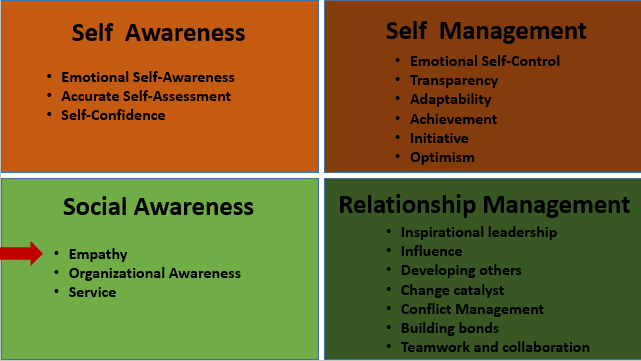Table of Contents
Emotional Self-awareness Sunnyvale TX
Two individuals can't potentially have the exact same needs, viewpoints, and expectations at all times. That needn't be a bad thing. Solving dispute in healthy, positive ways can strengthen trust between individuals. When dispute isn't perceived as threatening or punishing, it fosters flexibility, creativity, and safety in relationships. Authors: Jeanne Segal, Ph.
A middle supervisor for a large retail chain thinks about himself as a "get-it-done" kind of guy. If asked about his management design, he'll inform you that he is clear and assertive in making sure his subordinates know what needs to be done and when. If his department doesn't meet performance objectives, he knows it is because his staff didn't do their work effectively, not due to the fact that of his leadership.

What the supervisor considers "assertive," his staff will inform you is angry shouting and bullying. And those performance problems? They will say that everyone is so worn out of his bullying that they do not care whether they make their numbers, or perhaps that his behavior gets in the method of their performance.
What he lacks is Emotional Self-Awareness. With Psychological Self-Awareness, you understand your own feelings and their impact on your performance. You understand what you are feeling and whyand how it helps or injures what you are attempting to do. You pick up how others see you and your self-image shows that bigger reality.
It likewise offers you clearness on your values and sense of purpose, so you can be more definitive when you set a course of action. Leaders who are self-aware can acknowledge when their feelings have a negative effect on their work, or on individuals around them. They are then better equipped to resolve it in an efficient method, such as through creating chances for feedback, try out various methods to encourage their team, or being more open to innovative options.
Emotional Intelligence Rockwall TX

In sharp contrast, leaders low in Psychological Self-Awareness produced negative environments 78% of the time. Excellent leaders create a favorable emotional environment that motivates inspiration and extra effort, and they're the ones with excellent Emotional Self-Awareness. Research at Cornell University showed that a high Psychological Self-Awareness score was the greatest predictor of total success.
While it is simple to focus on Competencies that appear like they'll provide us quicker results, such as Influence or Conflict Management, without Psychological Self-Awareness we can only scratch the surface area of our complete capacity. This is the ability that needs the most patience and sincerity, and supplies the best structure for more developing Psychological and Social Intelligence in both work and life circumstances.
Every minute is a chance to be self-aware or not. It is a consistent endeavor, a conscious option to be self-aware. The good news is that the more you practice it, the easier it ends up being. Research study by my colleague and good friend Richard Davidson, a neuroscientist at the University of Wisconsin, recommends that one way to become more self-aware is to sign in with your sensory experience.

When emotions are activated, they are accompanied by bodily changes. There may be modifications in breathing rate, in muscle stress, in heart rate. Psychological Self-Awareness in part is the awareness of one's own body. Neuroscientists have assigned a very particular label to this and it's called interoception, the understanding of internal signals on the body.
So, the very first and genuine foundation for Emotional Self-Awareness is interoception. It's knowledge of what is going on in the body." Tuning in more to the body's signals is one useful way of developing self-awareness. Doing a Body Scan is another method for developing your ability to pick up the bodily modifications that accompany emotions.
Developing Emotional Intelligence - Addison Texas
This Guide provides a cutting-edge, research-based overview of the Psychological and Social Intelligence Leadership Competency Design, as well as the first Proficiency of Emotional Self-Awareness. It's a succinct read that anybody in a leadership position will benefit from.
Archi Trujillo/Getty Images Self-awareness appears to have ended up being the most current management buzzword and for good reason. Research recommends that when we see ourselves plainly, we are more positive and more creative. We make sounder decisions, build more powerful relationships, and communicate more effectively. We're less most likely to lie, cheat, and take.

And we're more-effective leaders with more-satisfied workers and more-profitable companies. As an organizational psychologist and executive coach, I have actually had a ringside seat to the power of leadership self-awareness for almost 15 years. I have actually likewise seen how attainable this ability is. When I initially started to dive into the research study on self-awareness, I was shocked by the striking gap between the science and the practice of self-awareness.
Table of Contents
Latest Posts
Emotional Intelligence (Eq): Components And Tips - Allen TX
How To Improve Your Emotional Intelligence Fort Worth TX
Emotionally Intelligent Leadership: Self-awareness And Self-management... Frisco TX
Navigation
Latest Posts
Emotional Intelligence (Eq): Components And Tips - Allen TX
How To Improve Your Emotional Intelligence Fort Worth TX
Emotionally Intelligent Leadership: Self-awareness And Self-management... Frisco TX